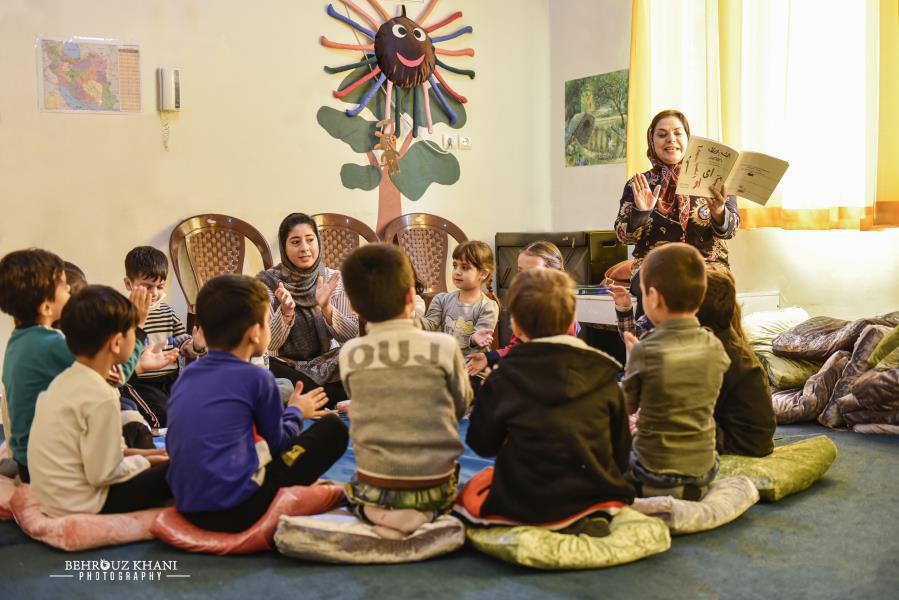Read with Me
Zohreh Ghaeni
A Conversation with Zohrah Ghaeni
Just briefly how did Read with Me begin? What was your inspiration? What are the aims and practice?
Reading literature with the aim of intellectual, emotional and social development of children is not an integral part of the Iranian education system. This problem is bolder in deprived communities, where children live in poverty, have to work and often their rights are violated.

A mother–child workshop at Koosha Kids House. Copyright © 2022 Read with Me.
In the deprived regions of Iran, where in the border villages and cities most of the families are poor and unemployed, many of them are involved in drug trafficking and their children experience neglect, abuse and violence. These children need much more than access to books.
They need to be read to and share quality books, they need to speak about their stories and their lives, they need to be able to construct a fantasy world, they need to be healed of their injuries through books, they need to be prepared to face big and serious problems.
Based on this reality, the Institute for Research on the History of Children’s Literature in Iran (IRHCLI) developed the Read with Me project aiming to make a meaningful change in the lives of deprived children through books and reading.
About 15 years ago we designed and implemented Read with Me as a reading promotion to promote reading for/with disadvantaged children who are generally at risk.

Shokoofan House of Children which is located in a marginal part of Tehran where kiln workers live with their families. Copyright © 2022 Read with Me.
As the project was designed to be implementable for groups of children of different ages and in all environments, Read with Me was carried out in locations as diverse as preschools located in remote villages, centres for working children in cities, nurseries, orphanages, hospitals, children affected by earthquakes and even in a factory for the family members and children with no ID card who are living mostly in Sistan and Balouchestan Province.
By now, about several hundred children and 1000s of teachers/tutors in 25 provinces have joined this project.
You mention the history of writing for young people and children in Iran – is this a very contemporary movement? Or is it something evident in the past? There are some wonderful stories coming from Iran – I think of the Shahnameh in particular.
More than 20 years ago (in 2000) we established the IRHCL, which is a non-governmental and non-profit organisation. The institute’s primary goal was to explore the history of Iran’s children’s literature and childhood studies. Hence, it has published the ten-volume researched books on the history of children’s literature of Iran consisting of information about children’s literature from ancient Persia to the Islamic Revolution era. They compile some facts on the history of children’s literature of Iran and the historical development of the children’s culture and education in different periods (https://koodaki.org/en/content/history-children%E2%80%99s-literature).

Red Cross first aid training with members of the Read with Me library. Zalan village Kermanshah. Copyright © 2022 Read with Me.
In setting up this project I know you were reaching out to communities that through circumstances (poverty, lack of access to education) had no access to books or reading. How did you identify or select a community to work with?
The Read with Me volunteer promoters from different provinces around Iran are the most reliable and informed group who can identify the eligible centres or communities to join this project. They introduce the centres to the project-manager team. After surveying the applications, the centres or communities would be selected.
Could you describe your experience with one – or even two such communities? How you approached them? Did you have to create different approaches to meet specific needs?
As I have already mentioned, Read with Me works in different fields. One of the first and important fields is collaborating with educational institutions such as schools and kindergartens. The Read with Me project is implemented in the schools and educational centres of many parts of Iran, mostly in deprived provinces of the country such as South Khorasan, Sistan and Baluchestan, Lorestan and Khouzestan as well as some schools in Afghanistan.
In Sistan and Baluchestan Read with Me has focused on basic literacy, and reading and writing skills improvement of children, especially bilingual children in this deprived province, through literature and book reading since 2015. The experts have evaluated the effects of the method on basic literacy improvement during this period as ‘amazing’. They believe that the project has improved reading and writing skills and expanded the vocabulary knowledge along with bringing joy and self-confidence to bilingual and nomadic students in the region.

Preschool children of a Nedaye-Mandgar Empowerment Institute in the southern part of Tehran. This centre supports low-income Iranian and Afghan families. Read with Me is implemented in this centre for preschoolers and also has workshops for mother–baby and toddler groups. Copyright © 2022 Read with Me.
Read with Me started the project in South Khorasan province with 800 preschoolers in 26 villages. The villages were located in remote areas close to the Iran–Afghanistan border. Since 2012 about 7,000 of 5–12-year-old children in preschools and schools have benefited from the quality books provided by the project. South Khorasan is another successful experience of the Read with Me project, where, by the efforts of compassionate and creative teachers, vast long-lasting effects on children’s learning process have been observed, especially among the children in preschools.
Do you have any anecdotes that you can relate that illustrate the impact this amazing programme has had on individuals or communities?
Seven years ago, children from the Ameneh Nursery (an orphanage centre) were visiting the Children’s Cultural Museum in Tehran, their silence and inability to express their needs and feelings sounded a serious and alarming problem. They had poor oral skills and a limited range of vocabulary. In nurseries, such as Ameneh, systematic neglect, lack of language communication and interaction has cast an overwhelming shadow on the children. Due to these deprivations, they exhibit odd behaviours that are interpreted as psychosomatic disorders, therefore, the Read with Me experts and staff decided to implement their reading program and activities in Ameneh Nursery.

Reading with families at a Read with Me library. Zalan village, Kermanshah. Copyright © 2022 Read with Me.
The psychologist of this centre believes:
Now, after a few years of implementing this project, children are aware of their own emotions and express them appropriately. Before the reading programme, older children bullied and beat younger ones, banging heads was frequent, repeated bedwetting was prevalent, but now they talk and bring up their problems. Their stress and anxiety have decreased, they appreciate feelings and emotions and when a caregiver upsets them, they complain – all these traits are incomparable to the past. (https://khanak.org/en/2021/content/seven-years-with-ameneh-nursery/)
Zohreh Ghaeni is a Children’s literature expert, translator, lecturer, researcher and historian. She is the co-writer of the ten-volume research book on the History of Children’s Literature in Iran. She founded Read with Me, a reading promotion programme in Iran for children in deprived areas of the country and children in crisis. Currently she is the director of the Institute for Research on the History of Children’s Literature in Iran, heading the Historical Childhood Studies in Iran research and leading the Read with Me project.
